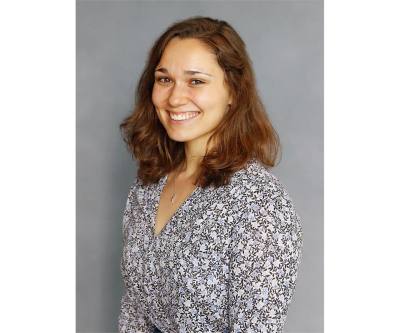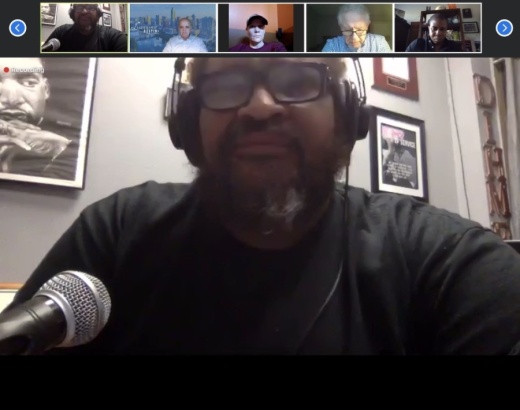"What good is it, my brothers and sisters, if someone claims to have faith but has no deeds? Can such faith save them?" he said.
Raising his head and addressing more than 60 participants attending the virtual vigil, Freeman said he firmly believes prayer can create change but added God calls on his followers to turn faith into functional change.
"I’m tired of doing this," Freeman said. "We’ve done this too many times. And nothing is going to change until we change it.”
Pflugerville city and religious leaders led a virtual vigil June 2, honoring the memory of George Floyd. On May 25, Floyd died in Minneapolis while in police custody. Floyd was handcuffed and lying face-down on the street. Minneapolis police officer Derek Chauvin, who has since been fired, had his knee on Floyd’s neck for 8 minutes and 46 seconds. Floyd became unresponsive and was later pronounced dead at a hospital.
Freeman was joined by fellow pastoral leaders, including Tom Cottar of First Baptist Church Pflugerville, Aaron Carter of Pflugerville First United Methodist Church, Steve Washburn of First Baptist Church Pflugerville and Richard Coaxum of St. Mary Missionary Baptist Church. From city leadership, Mayor Victor Gonzales; Pflugerville City Council Member Rudy Metayer; Pflugerville ISD trustee Tony Hanson; and Shontel Mays, the president and CEO of the Pflugerville Chamber of Commerce, were in attendance.
During the vigil, Freeman shared a music video he created in 2016, an anthem made to honor the black men, women and children lost to police brutality. It has been four years since he made that music video, Freeman said, but he said the same conversations are still being had.
Washburn, in leading prayer June 2, said the loss of Floyd has been an "overwhelming reality" for people across the country, adding he needs help seeing the reality of police brutality against black residents.
He said for himself as a white man, he does not know from experience what it is like to question whether an officer will pull him over and address him "with respect or reproach." The fears and conversations with children about their encounters with law enforcement, he said, are not his reality.
"That anxiety must be overwhelming," Washburn said.
Dava Watson, the wife of a 28-year veteran of the Austin Police Department, was in attendance at the June 2 vigil. She said her husband is a loving, compassionate man of integrity, adding those same sentiments describe "99% of police officers."
Racism, Watson said, is not a new phenomenon. It is a reality that has been present since biblical times, she said.
“And it grieved God then just as much as it grieves God now," Watson said. "And what grieves God should grieve us.”
What happened to Floyd, Watson said, is unequivocally "despicable." She added she cannot remember a time in recent history when the whole nation, regardless of race or political affiliation, agreed on something.
“Unity requires a community that works together," Watson said. "We, a community, must work together. And we can start by praying.”
Freeman said he does not condone or promote violent actions but said following decades of oppression and no relief, black Americans are tired of fighting for rights and liberties they should not have to fight for. Freeman called on those with positions of status and affluence to hold people accountable and proactively work toward undoing systems of oppression.
These conversations, Freeman said, can and will be uncomfortable and painful to listen to at points. But he said there has been a convenience allowed for too long, where people have become comfortable not being compassionate.
"It’s past time for us to do more than pray," Freeman said, later adding: "The desire is to move from being religious to being righteous."
Jim Rigby, a pastor at St. Andrew's Presbyterian Church, said he had been raised on a falsified history of brave white men going out into the world, taught that he was a template for others to emulate. Racism, Rigby said, is exemplified not only in acts of violence, such as Floyd's death. It is a trance, he said, that transcends evil individuals and can be found in everyday acts of microaggressions.
The path toward justice, Rigby said, extends beyond superficial healing. He said there needs to be a deep repentance so that the promises made on American rights are guaranteed to all.
"It is time and past time to be that beloved community where life, liberty and the pursuit of happiness is guaranteed to us all," he said.
Delivering the vigil's final address, Coaxum reflected on a time he and his wife were driving to a funeral in East Texas in a car with tinted glass. He said he was pulled over by a state trooper, who addressed him as "sir."
For black people, Coaxum said they will never know if they will hear "sir" or "boy" when red and blue lights flash behind them.
Floyd's death is not new, Coaxum said. A video recording of his death showed, from beginning to end, an example of what black people have experienced for decades.
Coaxum said he has shed more tears in the past few days than he has in a long time. Healing, he said, comes when people are given the wisdom and power to stand, hold hands and speak up against injustices committed against them.
"Prayer does change things," he said. "It makes us recognize how we are not and can't do—I can't fix it, and I can't handle it all by myself."





